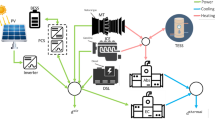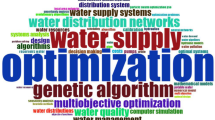Abstract
A novel hybrid genetic algorithm and cellular automata method is presented here for solving reliability-based reservoir operation problems. The method uses a decomposition approach in which the reliability part of the problem is handled with a GA, while the operational side of the problem is solved by a CA method. In the proposed method, a binary genetic algorithm is employed to determine success/failure periods of the operation. A period is considered as a success period if the corresponding gene value is one, and failure period if otherwise. The success/failure pattern suggested by the genetic algorithm is used to explicitly rewrite the reliability constraints of the operation problem in terms of the reservoir releases. A CA method is then used to solve the resulting problem in which the two types of the constraints, namely operational constraints and reliability constraints, are dealt with differently. Operational constraints are applied to all periods, while reliability constraints are only applied to the success periods determined by genetic algorithm. The proposed method is used for monthly water supply and hydropower operation of Dez reservoir in Iran, and the results are presented and compared with those of a GA model. The efficiency and effectiveness of the method are tested for the short-, medium- and long-term operation periods assuming different target reliabilities. Comparison of the results with those of a GA model shows that the proposed method is both more effective and efficient compared to GA.








Similar content being viewed by others
References
Afshar A, Bozorg Haddad O, Marino MA, Adams BJ (2007) Honey-bee mating optimization (HMBO) algorithm for optimal reservoir operation. J Franklin Inst 344:452–462
Afshar A, Masoumi F, Solis SS (2015) Reliability based optimum reservoir design by hybrid ACO-LP algorithm. Water Resour Manage 29(6):2045
Afshar MH, Shahidi M (2009) Optimal solution of large-scale reservoir operation problems: cellular automata versus heuristic search methods. Eng Optim 41:275–293
Afshar MH, Shahidi M, Rohani M, Sargolzaei M (2011) Application of cellular automata to sewer network optimization problems. Sci Iran 18(3):304–312
Afshar MH, Rohani M (2012) Optimal design of sewer networks using cellular automata-based hybrid methods: discrete and continuous approaches. Eng Optim 44:1–22
Afshar MH (2013) A cellular automata approach for the hydro-power operation of multi-reservoir systems. Proc ICE Water Manag 166(9):465–478
Afshar A, Masoumi F, Solis SS (2015) Reliability based optimum reservoir design by hybrid ACO-LP algorithm. Water Resour Manag 29(6):2045–2058
Archibald TW, Mckinnon KIM, Thomas LC (2006) Modeling the operation of multi reservoir systems using decomposition and stochastic dynamic programming. Naval Res Logist 53:217–225
Asgari H-R, Bozorg-Haddad O, Pazoki M, Loáiciga HA (2016) The weed optimization algorithm for optimal reservoir operation. J Irrig Drain Eng 142(2):04015055. doi:10.1061/(ASCE)IR.1943-4774.0000963
Askew AJ (1974) Optimum reservoir operating policies and the imposition of a reliability constraint. Water Resour Res 10:51–56
Azizipour M, Ghalenoei V, Afshar MH, Solis SS (2016) Optimal operation of hydropower reservoir systems using weed optimization algorithm. Water Resour Manag 30(11):3995–4009
Braga BPF et al (1991) Stochastic optimization of multiple-reservoir system operation. J Water Resour Plan Manag ASCE 117(4):471–481
Cai XM, Mckinney DC, Ladon LS (2001) Solving nonlinear water management models using a combined genetic algorithm and linear programming approach. Adv Water Resour 24:667–676
Crawley PD, Dandy GC (1993) Optimal operation of multiple-reservoir system. J Water Resour Plan Manag ASCE 119:1–17
Dahe PD, Srivastava DK (2002) Multi reservoir multi yield model with allowable deficit in annual yield. J Water Resour Plan Manag ASCE 128:406–414
Espinoza FP, Minsker BS (2006) Development of the enhanced self-adaptive hybrid genetic algorithm (e-SAHGA). Water Resour Res 42(8):
Eastman J, ReVelle C (1973) Linear decision rule in reservoir management and design: 3. Direct capacity determination and intraseasonal constraints. Water Resour Res 9(1):29–42
Georgiou PE, Papamichali DM, Vougioukas SG (2006) Optimal irrigation reservoir operation and simultaneous multi-crop cultivation area selection using simulated annealing. Irrig Drain 55(2):129–144
Giuliani M, Herman JD, Castelletti A, Reed P (2014) Many-objective reservoir policy identification and refinement to reduce policy inertia and myopia in water management. Water Resour Res 50(4):3355–3377
Guo Y, Keedwell EC, Walters GA, Khu ST (2007a) Hybridizing cellular automata principles and NSGAII for multi-objective design of urban water networks. Comput Sci Math 44(3):546–559
Guo Y, Walters GA, Khu ST, Keedwell EC (2007b) A novel cellular automata based approach to optimal storm sewer design. Eng Optim 39(3):345–364
Gundelach J, ReVelle C (1975) Linear decision rule in reservoir management and design: 5. A general algorithm. Water Resour Res 11(2):204–207
Hogan AJ, Morris JG, Thompson HE (1981) Decision problems under risk and chance constrained programming: dilemmas in the transition. Manage Sci 27(6):698–716
Holland JH (1975) Adaptation in natural and artificial systems. The University of Michigan Press, Ann Arbor
Houck MH (1979) A chance constrained optimization model for reservoir design and operation. Water Resour Res 15(5):1011–1016
Houck MH, Cohon JL, ReVelle CS (1980) Linear decision rule in reservoir design and management: 6. Incorporation of economic efficiency benefits and hydroelectric energy generation. Water Resour Res 16(1):196–200
Jalali MR, Afshar A, Marino MA (2006) Reservoir operation by ant colony optimization algorithms. Iran J Sci Technol Trans B Eng 30(B1):107–117
Joeres EF, Seus G, Engelmann HM (1981) The Linear Decision Rule (LDR) reservoir problem with correlated inflows: 1. Model development. Water Resour Res 17(1):18–24
Jothiprakash V, Shanthi G (2006) Single reservoir operating policies using genetic algorithm. Water Resour Manag 20(6):917–929
Keedwell E, Khu ST (2005) A hybrid genetic algorithm for the water distribution networks. J Eng Appl Artif Intell 18:461–472
Khadem M, Afshar MH (2014) A hybridized GA with LP-LP model for the management of confined groundwater. Groundwater 53(3):485–492
Kumar DN, Reddy MJ (2006) Ant colony optimization for multipurpose reservoir operation. Water Resour Manag 20(6):879–898
Kumar DN, Reddy MJ (2007) Multipurpose reservoir operation using particle swarm optimization. J Water Resour Plan Manag 133(3):192–201
Li XG, Wei X (2008) An improved genetic algorithm-simulated annealing hybrid algorithm for the optimization of multiple reservoirs. Water Resour Manag 22(8):1031–1049
Loucks DP, Stedinger JR, Haith DA (1981) Water Resour Syst Plan Anal. Prentice Hall, Englewood Cliffs
Marino MA, Mohammadi B (1983) Reservoir management: a reliability programming approach. Water Resour Res 19:613–620
Mousavi Jamshid, Shourian M (2010) Capacity optimization of hydropower storage projects using particle swarm optimization algorithm. J Hydroinformatics 12(3):275–291
Needham JT, Watkins DW Jr, Lund RR, Nanda SK (2000) Linear programming for flood control in the lowa and Des Moines Rivers. J Water Resour Plan Manag ASCE 126:118–127
Oliveira R, Loucks DP (1997) Operating rules for multi-reservoir systems. Water Resour Res 33(4):839–852
Reis LFR, Walters GA, Savic D, Chaudry FH (2005) Multi reservoir operation planning using hybrid genetic algorithm and linear programming (GA-LP): an alternative stochastic approach. Water Resour Manag 19:831–848
Reis FR, Bessler FT, Walters GA, Savic D (2006) Water supply reservoir operation by combined genetic algorithm-linear programming (GA-LP) approach. Water Resour Manag 20:227–255
ReVelle CS, Joeres E, Kirby W (1969) The linear decision rule in reservoir management and design. 1, development of the stochastic model. Water Resour Res 5(4):767–777
Sniedovich M (1979) Reliability-constrained reservoir operation control problems: 1. Methodological issues. Water Resour Res 15:1574–1582
Teegavarapu RSV, Simonovic SP (2002) Optimal operation of reservoir systems using simulated annealing. Water Resour Manag 16(5):401–428
Tejada-Guibert JA, Johnson SA, Stedinger JR (1993) Comparison of 2 approaches for implementing multi reservoir operating policies derived using stochastic dynamic programming. Water Resour Res 29:2139–2153
Ulam SM (1952) Random process and transformations. In: Proceedings of the international congress of mathematics, vol 2, pp 264–275 (1952, held in 1950)
Wardlaw R, Sharif M (1999) Evaluation of genetic algorithms for optimal reservoir system operation. J Water Resour Plan Manag ASCE 125:25–33
Yi J, Labadie JW, Stiff S (2003) Dynamic optimal unit commitment and loading in hydropower systems. J Water Resour Plan Manag ASCE 129:388–398
Yurtal R, Seckin G, Ardicliglu M (2005) Hydropower optimization for the lower Seyhan system in Turkey using dynamic programming. Water Int 30(4):522–529
Author information
Authors and Affiliations
Corresponding author
Ethics declarations
Conflict of interest
Authors declare that they have no conflict of interest.
Ethical approval
This article does not contain any studies with human participants or animals performed by any of the authors.
Additional information
Communicated by V. Loia.
Rights and permissions
About this article
Cite this article
Azizipour, M., Afshar, M.H. Reliability-based operation of reservoirs: a hybrid genetic algorithm and cellular automata method. Soft Comput 22, 6461–6471 (2018). https://doi.org/10.1007/s00500-017-2698-0
Published:
Issue Date:
DOI: https://doi.org/10.1007/s00500-017-2698-0




